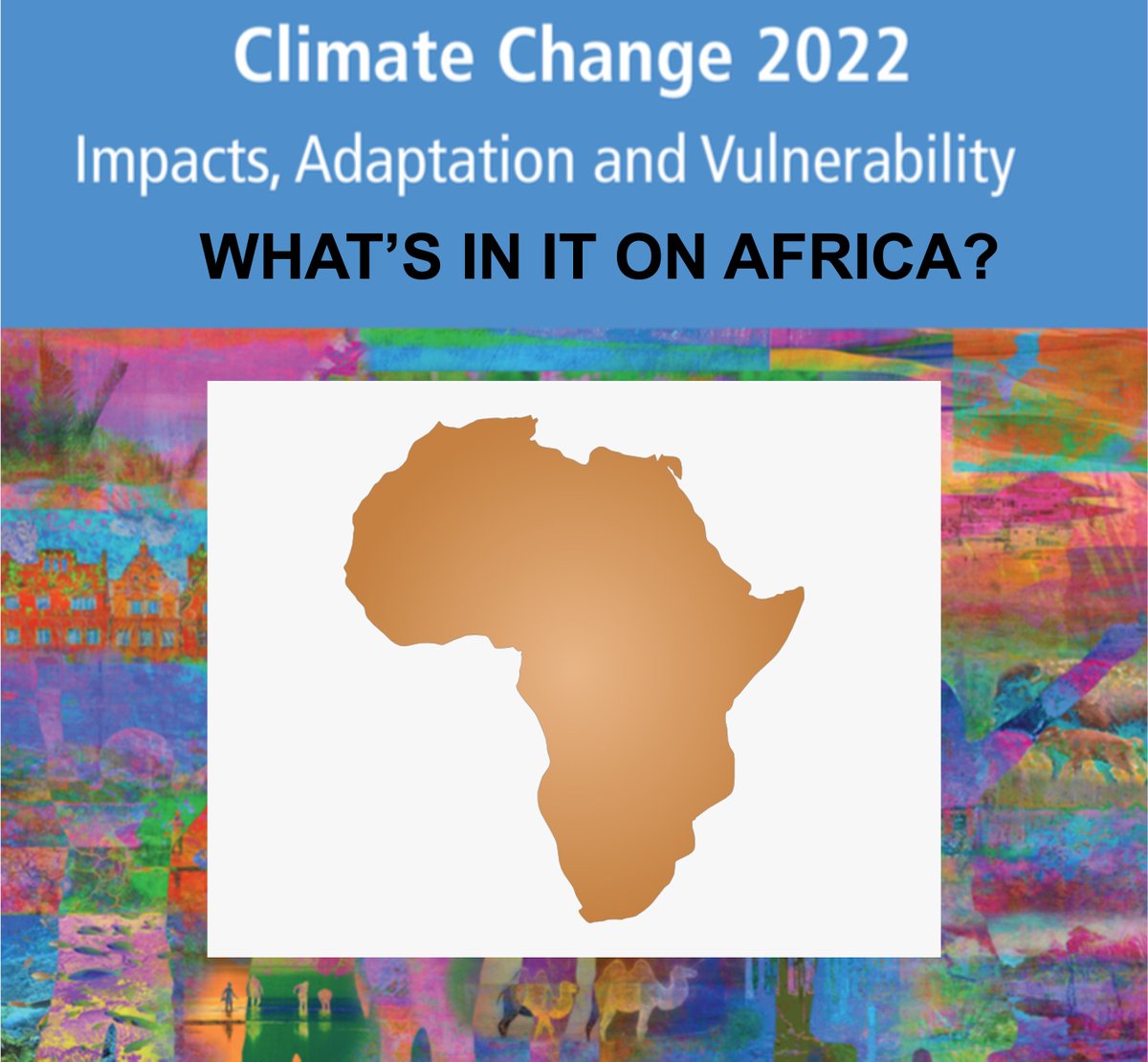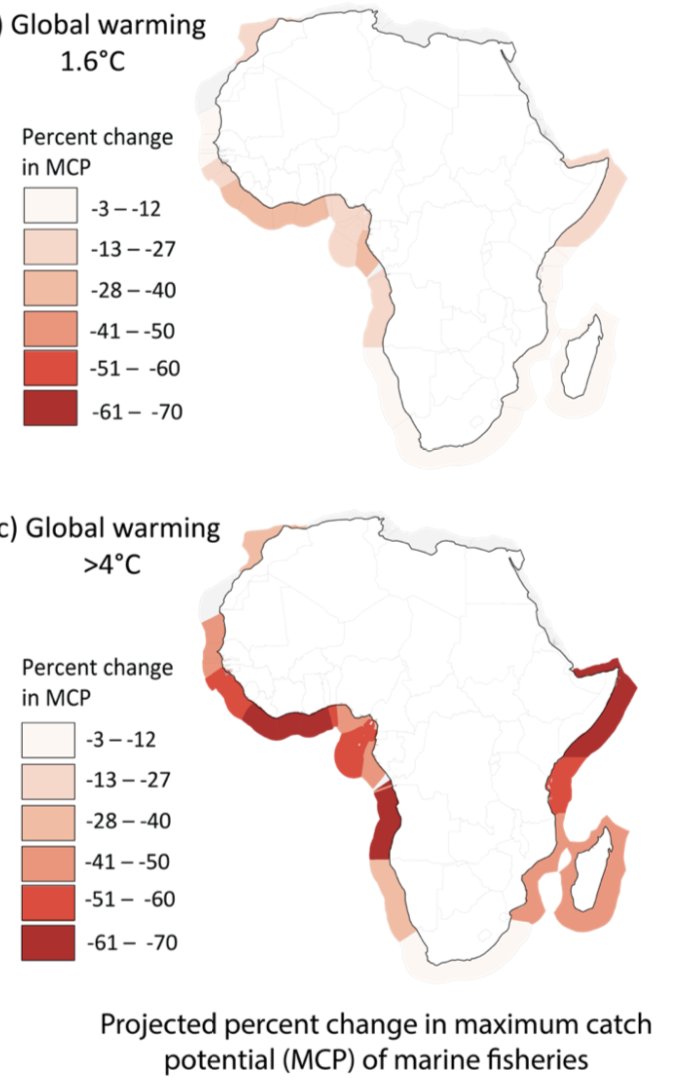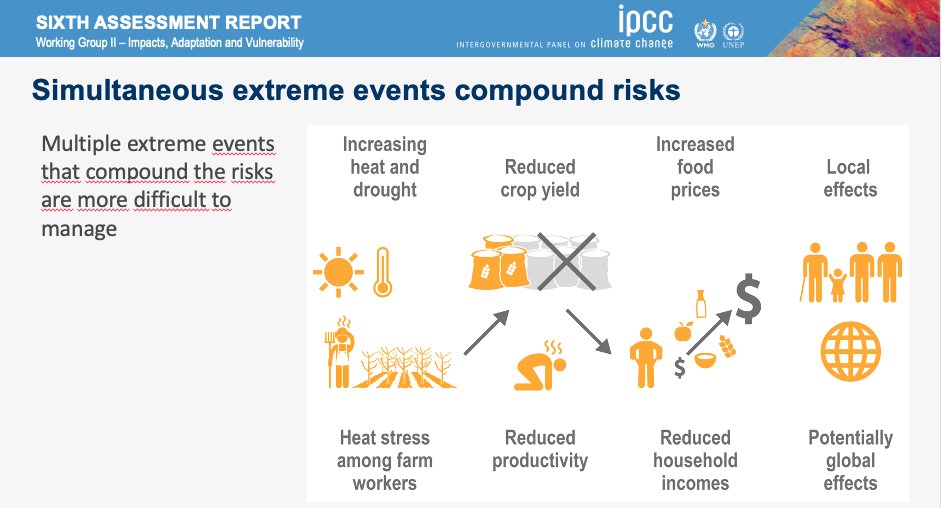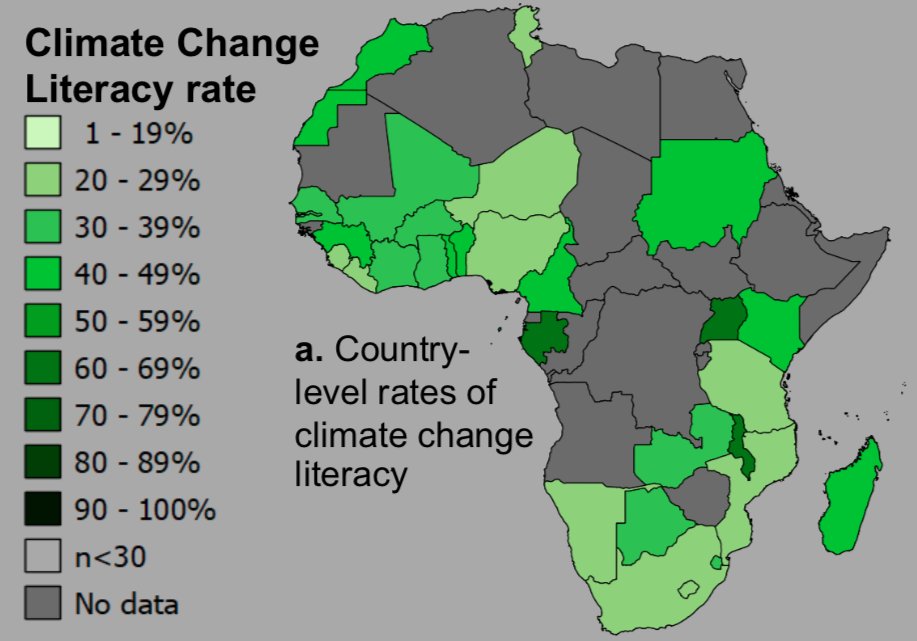I'm an author on the new #ipcc report and I study climate change impacts and adaptation options in #Africa. 🧵: How bad could it get? Who is most vulnerable? How can we adapt? Here's a report summary for Africa.
full report bit.ly/3vtrZhX
tldr bit.ly/3stJexM
full report bit.ly/3vtrZhX
tldr bit.ly/3stJexM

Multiple African countries are the most vulnerable to climate change impacts globally, especially countries in West, Central and East Africa
@cdknetwork has factsheets coming soon for each African sub-region

@cdknetwork has factsheets coming soon for each African sub-region


Most African countries have contributed among the least to greenhouse gas emissions causing climate change.
But key development sectors in Africa already suffered widespread loss and damage attributed to human-induced climate change #climateinjustice
But key development sectors in Africa already suffered widespread loss and damage attributed to human-induced climate change #climateinjustice

Increased temperatures and lower rainfall have reduced economic output in Africa, with **larger negative impacts than other regions of the world**
This has increased income inequality between Africa and countries in more temperate, Northern Hemisphere climates
This has increased income inequality between Africa and countries in more temperate, Northern Hemisphere climates

🌽Agricultural productivity growth in Africa has been reduced by 34% since 1961 due to climate change, **more than any other region**.
🌽Maize yields decreased 5.8% and wheat yields decreased 2.3% in sub-Saharan Africa due to climate change
🌽Maize yields decreased 5.8% and wheat yields decreased 2.3% in sub-Saharan Africa due to climate change
🐠🐘🌳For ecosystems: Ocean heatwaves have caused mass coral reef bleaching in East Africa.
On land, increasing CO2 is causing shrubs and trees to invade grasslands, reducing grazing land and water supplies. 🐮
On land, increasing CO2 is causing shrubs and trees to invade grasslands, reducing grazing land and water supplies. 🐮
We’re at 1.1C global warming now. Future risks will increase for 1.5C and 2C global warming.
Most African countries will reach unprecedented temperatures earlier this century than generally wealthier, higher latitude countries.
Adaptation is urgent (but first the risks)
Most African countries will reach unprecedented temperatures earlier this century than generally wealthier, higher latitude countries.
Adaptation is urgent (but first the risks)

Above 1.5C global warming: 🐠🐟fisheries catch potential drops by up to 40% in tropical Africa; leaving close to 300 million people at risk of micronutrient deficiencies, especially children and pregnant women 

At 2C: 🌽🌾losses of staple crops are projected across Africa, even when using adaptation options such as genetically engineered maize
Above 1.5C global warming: 🚑🥵 the risk of heat-related death rises sharply.
The number of potentially lethal heat days is projected to exceed 50 days per year in West Africa
At 1.8C global warming many African cities could see heatwaves of 15 days above 42C
The number of potentially lethal heat days is projected to exceed 50 days per year in West Africa
At 1.8C global warming many African cities could see heatwaves of 15 days above 42C
🦟🦟 At 1.5°C of global warming the distribution and seasonal transmission of vector-borne diseases is expected to increase, exposing tens of millions more people to disease, mostly in East and Southern Africa
In African cities, climate change risks will be made worse by rapid urbanisation in low-lying coastal areas and high numbers of people living in informal settlements
Currently, 59% of urban dwellers in Sub-Saharan Africa live in informal settlements
Currently, 59% of urban dwellers in Sub-Saharan Africa live in informal settlements
Damages from future sea-level rise could reach USD 2.9 billion in Maputo, USD 9.4 billion in Lagos, and USD 117.5 billion in Alexandria by 2050 

All these risks overlap each other, like a disaster movie
Many African countries are projected to face compounding risks from reduced food production across crops, livestock and fisheries; increasing heat-related mortality; heat-related loss of labour productivity; and flooding
Many African countries are projected to face compounding risks from reduced food production across crops, livestock and fisheries; increasing heat-related mortality; heat-related loss of labour productivity; and flooding

Forest, grassland and savanna biomes will shift across the continent, changing grazing lands and species habitats
Local biodiversity loss increases with every bit of warming
At 2C global warming, 7 % to 18% of species in Africa are projected to be at risk of extinction
Local biodiversity loss increases with every bit of warming
At 2C global warming, 7 % to 18% of species in Africa are projected to be at risk of extinction

🚶♂️🚶♀️Migration:
At 1.7C global warming, over 17 million Africans could be forced to migrate within the continent due to changes in food and water security.
This could increase to over 50 million people at 2.5C global warming.
At 1.7C global warming, over 17 million Africans could be forced to migrate within the continent due to changes in food and water security.
This could increase to over 50 million people at 2.5C global warming.
So, in Africa, we need to ADAPT MUCH FASTER
There is a rapidly closing opportunity for bold climate action to reduce these risks.
Rapid and deep cuts in greenhouse gas emissions are also **essential**
How can we adapt?
There is a rapidly closing opportunity for bold climate action to reduce these risks.
Rapid and deep cuts in greenhouse gas emissions are also **essential**
How can we adapt?
Major constraints to adaptation in Africa are technological, financial, and governance/institutional.
Africa is not alone in these constraints
But Africa has some especially big challenges and some big opportunities
Africa is not alone in these constraints
But Africa has some especially big challenges and some big opportunities

Challenges: Since 1990 only 4% of climate change research funding globally focused on Africa and **less than 1% went to researchers in Africa**
This massively limits the ability of Africans to understand climate change risks
More funding for African researchers is essential


This massively limits the ability of Africans to understand climate change risks
More funding for African researchers is essential



Accelerated Adaptation Action will require a lot of money. And, right now, finance for adaptation in Africa is billions of dollars less than the estimated adaptation costs.
Even worse, less than half of the finance committed to adaptation has actually been disbursed
Even worse, less than half of the finance committed to adaptation has actually been disbursed

More finance is required from rich countries to help the most vulnerable countries adapt.
And many vulnerable countries will require grants. Currently, 57% of adaptation finance for African countries is in the form of further debt.
Much more private sector finance is required
And many vulnerable countries will require grants. Currently, 57% of adaptation finance for African countries is in the form of further debt.
Much more private sector finance is required
Opportunities: Education is a major part of climate change adaptation because understanding climate change can help people anticipate future risks and adapt to them
Across 33 African countries only 23–66% of people understand the human causes of climate change.
Across 33 African countries only 23–66% of people understand the human causes of climate change.

Social protection programs such as cash transfers and healthcare access are effective at reducing climate risk
A big opportunity is integrating climate risk management into social protection programs (e.g. public works programs that employ people to restore ecosystems)
A big opportunity is integrating climate risk management into social protection programs (e.g. public works programs that employ people to restore ecosystems)
Another big opportunity is developing early warning systems to inform farmers, healthcare workers and others when a climate hazard is coming.
This requires a major investment in weather stations across Africa
This requires a major investment in weather stations across Africa

Ecosystem-based adaptation is also effective and often cheaper than grey infrastructure.
e.g. using mangrove forests to protect against storm surges and coastal flooding
BUT for nature to help us, we need to keep global warming levels low. Above 1.5C many ecosystems can't cope
e.g. using mangrove forests to protect against storm surges and coastal flooding
BUT for nature to help us, we need to keep global warming levels low. Above 1.5C many ecosystems can't cope

Another ecosystem-based action, planting trees🌳🌳🌳 can help a lot — when it restores natural forests.
BUT planting forests where they do not naturally occur (e.g. grasslands or savanna) increases risk by increasing wildfires and reducing water security🔥💧
BUT planting forests where they do not naturally occur (e.g. grasslands or savanna) increases risk by increasing wildfires and reducing water security🔥💧
An all-of-government approach to climate action is required where climate change is a priority issue for major ministries like finance and planning, not just the environment ministry
thanks to all the many contributing authors on the Africa chapter including @IndraOverland and @geo_savvidou for helping us track the finance for climate research and for adaptation in Africa. And to @NickZimson and @zvobgoluckson1 for holding the whole chapter together
Lastly, an inclusive approach to adaptation is required.
The greatest gains in wellbeing can be achieved by prioritising investment to reduce climate risk for low-income and marginalised people, including people living in informal settlements
full report bit.ly/3vtrZhX
The greatest gains in wellbeing can be achieved by prioritising investment to reduce climate risk for low-income and marginalised people, including people living in informal settlements
full report bit.ly/3vtrZhX
• • •
Missing some Tweet in this thread? You can try to
force a refresh





